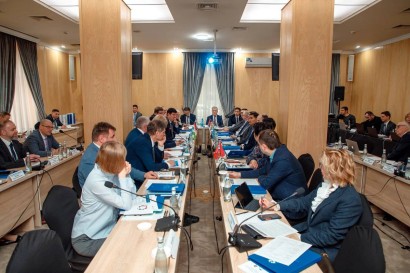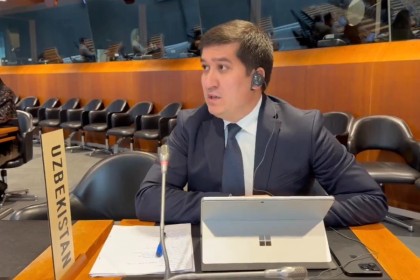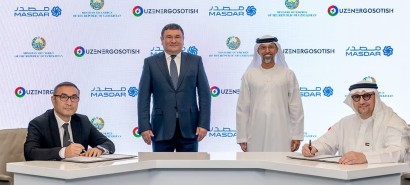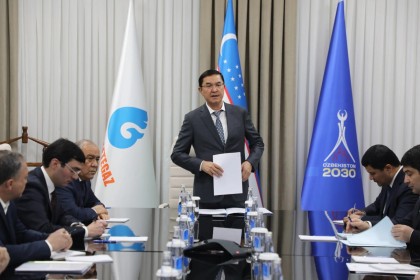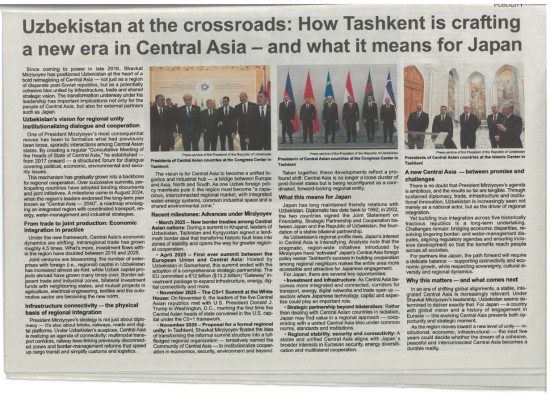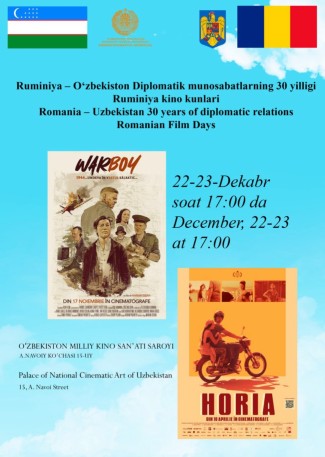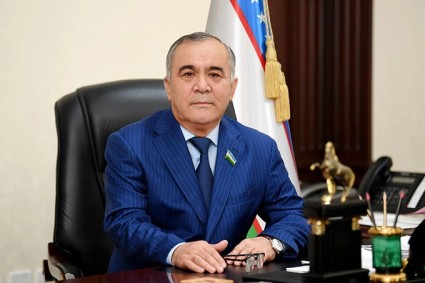The Ambassador of Bangladesh to Uzbekistan, Mosud Mannan, answered questions of The Tashkent Times on the current state and future of Uzbekistan-Bangladesh ties.
-Good afternoon, Your Excellency Mr Ambassador! It is great honour and privilege to meet You. On December 16, Bangladesh will celebrate Victory Day. Could You please tell us more about this auspicious day, why is it so significant for Bangladesh and the people of Bangladesh?
After many decades of struggle the Bengoli people always wanted to have freedom. In 1971 elections were held in Bangladesh, then the East Pakistan, demanding correct place within the existing structure at that time. Unfortunately even when the leader of our nation Sheikh Mujibur Rahman won the general election with a clear majority in the end of 1971, the Pakistan military government headed by Yahya Khan was not willing to hand over power. Then the Bengali people under the leadership of Sheikh Mujibir Rahman started to demand independence. On 7 March 1971 Sheikh Mujibir Rahman gave his now famous speech in Ramna Race where he called for adequate preparations for struggle for independence. This speech has been recently recognized by UN as the best speech eve given by somebody.
During the early hours of 26 March 1971 Sheikh Mujibur Rahman declared the independence of Bangladesh, afterwards he was taken to custody by the army and was flown to West Pakistan. Then the Liberation War started with the support from USSR and India, which resulted in the death of about 3 million people of Bangladesh,
The combined army later with military support from friendly nations defeated the Pakistan Army, and Pakistan surrendered in Dacca on 16 December 1971. That is why this day is marked in Bangladesh as Victory Day. This was a glorious moment for us, because for many centuries the Bengali people had strived for independence, as part of British Empire or part of Pakistan.
For us 16 December 1971 marks the beginning of Bengali emancipation when the long desired goal was achieved, which is to have country of our own.
-Bangladesh was one of the first to recognize Uzbekistan’s independence, since then how would evaluate the Uzbekistan-Bangladesh ties, and in particular during your tenure as Bangladesh’s Ambassador to Uzbekistan?
In 1992 Bangladesh recognized Uzbekistan, in 1996 was established Bangladeshi Embassy in Uzbekistan. But the actual bilateral ties date back to the time of Amir Timur when India came in touch with Central Asia, but more specifically we became close to Uzbek people when Babur came to India and established an empire in the Indian sub-continent, but he became known even to the furthest eastern corner of South Asia, when at that time it was called Bengal. During Babur’s rule the people from Bengal visited his court and showed respect to him. When Babur’s grandson Akbar came to power at that time, he conquered Bengal, and he was a very famous leader, he even introduced Bengali calendar. Akbar’s son Djahangir founded Bangladesh’s capital, Dhaka city, also known as Djahangir Nagar.
Since establishment of diplomatic relations between Uzbekistan and Bangladesh, the bilateral ties have been steadily developing. As second largest producer of ready-made garments in the world, Bangladesh was dependent on importing cotton, and particularly the high quality Uzbek cotton. Over the years Bangladesh has become the largest buyer of Uzbek cotton buying almost 30% of Uzbekistan’s high quality cotton. It is indeed during my tenure, I started my posting in 2013, that in 2015-2016 Bangladesh became the biggest buyer of Uzbek cotton.
High level visits were exchanged from the very beginning of establishment of diplomatic relations, Mr Kamilov who was the Foreign Minister paid a visit to Bangladesh in the 90’s, and taking this opportunity I want to congratulate him on his 70th anniversary and his being awarded the Order for Dedicated Service to the nation by Honorable Mr. Mirziyoyev. I also had the opportunity to take Mr Elyor Ganiyev, then the Minister Foreign economic relations minister to Bangladesh in 2014, our Foreign minister Abdu Samad Azad visited Uzbekistan, who fell in love with Uzbekistan, also Commerce minister, Vice minister for Commerce, the Interior minister of Bangladesh also visited Uzbekistan, and last year our Education minister visited the high level IOC foreign ministers meeting which was hosted by Tashkent.
These visits show how excellent relations without any kind differences or misunderstandings the two countries have, which is another great thing what we have achieved over the last 25 years.
We have already have signed several joint venture agreements in the field of pharmaceuticals. Especially since the liberalization of the foreign exchange system allowing free repatriation of profits in September this year, the said deals will undoubtedly materialize. Later this month the Uzbek Deputy PM Kuchkarov is expected to visit Bangladesh.
Bangladeshi folk song performers regularly attend Sharq Taronalari folk music festival, with many photographic and paintings exhibitions and film festivals organized in Tashkent by the embassy itself and also in Bishkek, as I am the Bangladesh’s Ambassador to Kyrgyzstan, Kzakhstan and Afghanistan as well.
- Bangladesh is a marvelous country in terms of nature, beaches, culture, cuisine. and therefore a wonderful tourist destination, but it is a country Uzbeks know little about. What steps are needed to rectify this?
We have been working to promote tourism on both sides. We are currently discussing the issue of resuming direct flights between Tashkent and Dhaka, which was suspended in 2004. Recently I had talks with the new DG of Uzbekistan Airways Mr. Rozukulov and he has promised to resume flights, since the flight to Lahore (Pakistan) has been resumed, and why not with Dhaka. Direct and charter flights will be hopefully launched within 6 months. In fact Uzbekistan is very attractive for religious tourism, people are keen to visit the sites of Imam al-Bukhari, Imam al-Naqshbandi and Imam at-Termuzi, the cities of Samarkand, Bukhara, Khiva and Tashkent.
And in Bangladesh Uzbeks can visit Cox’s Bazar, with its longest sand sea beach in the world, Sundarbans with its Royal Bengal tigers, beautiful green mountains in Chittagong, our tea gardens in Sylhet, Baburids mosques and palaces in Dhaka city. Many cities in Bangladesh have many beautiful Hindu and Buddhist monuments and temples.
-Since the new leadership, Uzbekistan is trying to step up ties with all countries. How do you see the Uzbek-Bangladeshi ties be developing in the future?
Indeed large scale reforms in all areas have been undertaken by the Government of Uzbekistan under the leadership of President Mirziyoyev. We are now trying to diversify our ties not only focusing on trading of ready-made garments or cotton, we are trying to help Uzbekistan develop its ready-made garments industry because the government of Uzbekistan is interested, and Deputy PM Kuchkarov’s visit is expected to explore possibilities of setting up JVs, in particular in ready-made garments, and possibly we could seek financing from third country for a large ready-made garments manufacturing facility for a huge tripartite project, and export the goods to third countries.
We are also exploring the possibility of assembling Uzbek cars in Bangladesh. Uzbekistan GM’s Matiz and Spark, which have good mileage, are just right for Bangladesh’s roads.
With hopefully launching of direct flights, now there will be more opportunities for bigger business with cargo flights which could also be very profitable, for example, to export Uzbek fruits and vegetables to Bangladesh, some fruit varieties in Uzbekistan, such as apricot, cherries are not grown in Bangladesh, which could be exported as fruits or juices, which I proposed and which found support.
Uzbek fertilizers and agrochemicals which are of very high quality can also be marketed in Bangladesh, as we have a vast agriculture sector, since we are now buying fertilizers from remote countries like Belarus, Russia and Czech Republic.
Uzbekistan’s agromachineries, tractors manufacturing sector is very developed, which can be exported to Bangladesh, I have been to Uzbekistan for 4 years and I know in which sectors Uzbekistan is very good. Uzbekistan can promote these businesses.
Bangladesh can offer ready-made garments, jute and jute goods, world quality sea-fish, prawns, shrimps, lobsters. Bangladesh’s tiger prawns are renowned in the world, as well as ceramics, our handicrafts, pharmaceuticals, software. We also have high quality tea, both organic and normal tea, leather and leather goods.
Regarding humanitarian ties, the countries could establish student, youth exchange programs, exchange ideas, this can be done in a very well planned manner.
-Thank You very much Mr. Ambassador for this interview we wish You successes in all Your endeavors
My best wishes ahead of the Victory Day. I also offer my best wishes to all the people of Uzbekistan on the occasion of the upcoming Uzbekistan’s Constitution Day.



